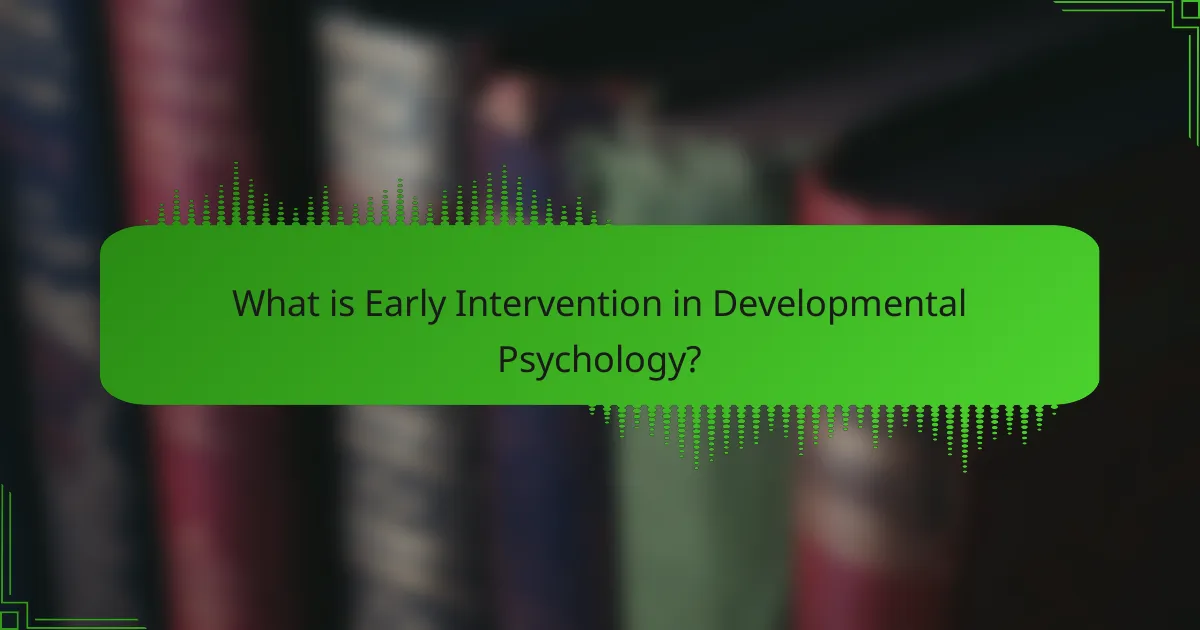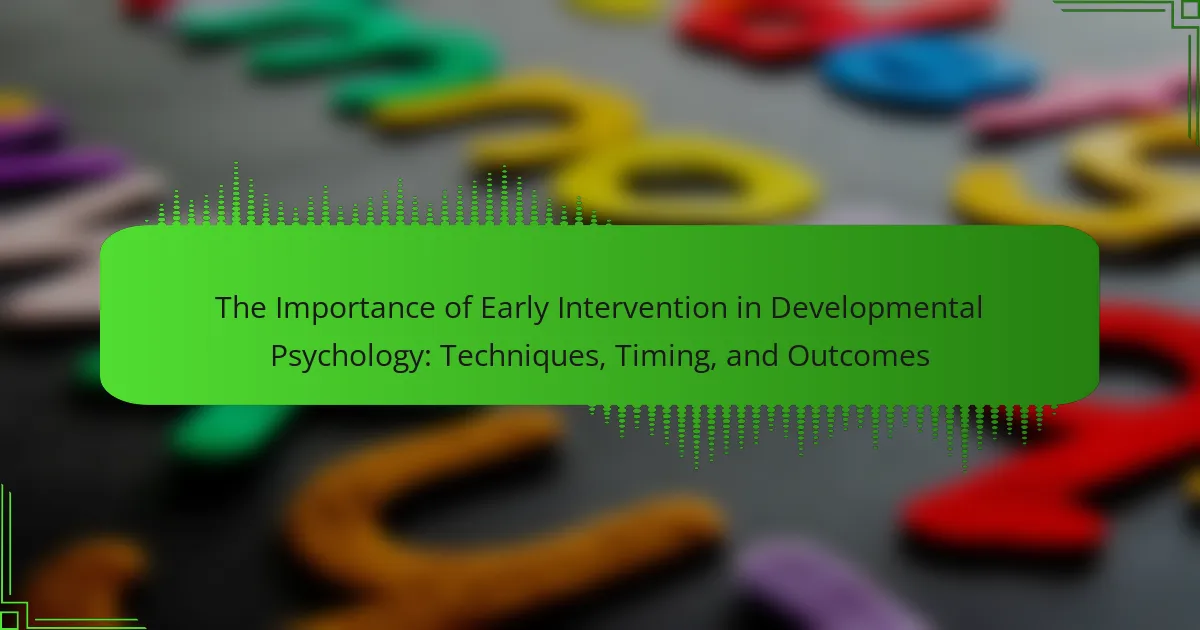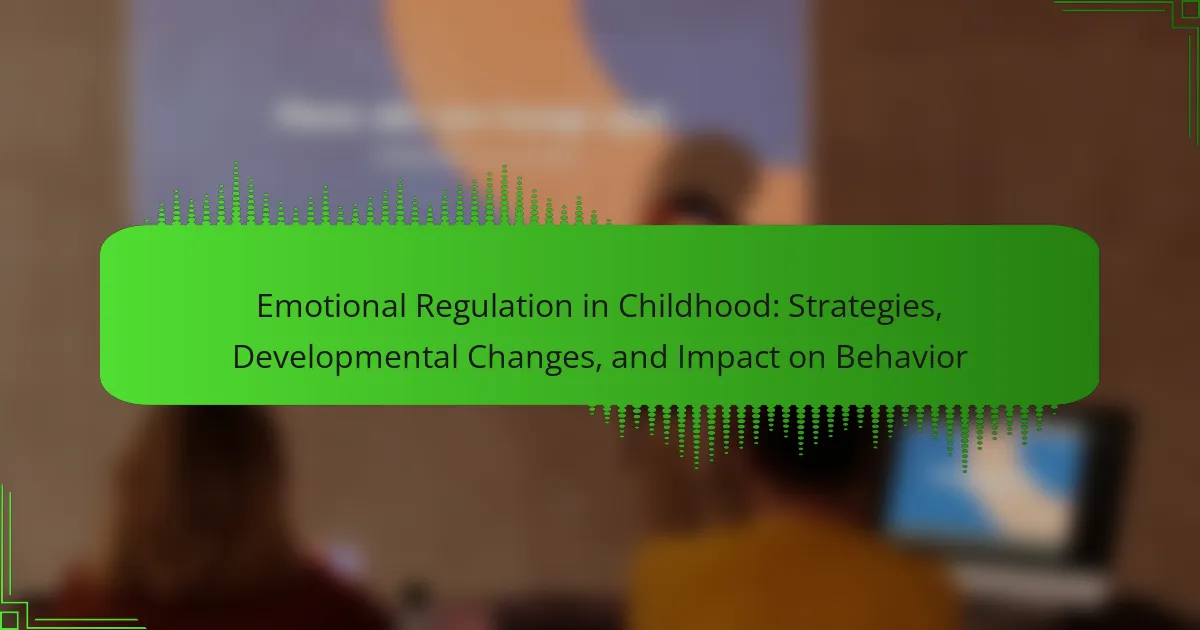Early intervention in developmental psychology encompasses strategies and services aimed at supporting children at risk of developmental delays, particularly from birth to age three. This critical period is essential for cognitive and emotional development, and timely intervention can lead to significant improvements in language, social skills, and academic performance. The article explores various techniques used in early intervention, the optimal timing for these interventions, and the positive outcomes associated with effective programs, including therapy, family support, and tailored educational services. Research findings underscore the importance of early intervention in enhancing developmental trajectories for children receiving these services.

What is Early Intervention in Developmental Psychology?
Early intervention in developmental psychology refers to strategies and services provided to children at risk of developmental delays. This approach aims to promote optimal development and minimize the impact of identified delays. Early intervention typically targets children from birth to age three, a critical period for cognitive and emotional growth. Research indicates that timely intervention can significantly improve outcomes in areas such as language, social skills, and academic performance. Programs may include therapy, family support, and educational services tailored to individual needs. The effectiveness of early intervention is supported by studies showing enhanced developmental trajectories for children receiving these services compared to those who do not.
Why is Early Intervention considered crucial in developmental psychology?
Early intervention is crucial in developmental psychology because it addresses developmental delays and enhances long-term outcomes. Research indicates that early support can significantly improve cognitive, social, and emotional development. The first few years of life are critical for brain development. During this period, the brain is highly adaptable and responsive to experiences. Early intervention capitalizes on this plasticity to promote positive changes. Studies show that children who receive early intervention are more likely to succeed in school and life. For example, the National Early Childhood Technical Assistance Center highlights that early intervention can reduce the need for special education services later on. Additionally, early intervention fosters family involvement, which is vital for a child’s development. Overall, timely support can lead to better developmental trajectories and enhanced quality of life.
What are the key principles of early intervention?
The key principles of early intervention include timely support, family involvement, and individualized services. Timely support ensures that interventions are provided as soon as developmental delays are identified. Research shows that early intervention can significantly improve outcomes for children (e.g., the National Early Childhood Technical Assistance Center emphasizes the importance of early action). Family involvement encourages active participation from caregivers in the intervention process. Individualized services cater to the specific needs of each child, ensuring that interventions are tailored effectively. These principles are essential for maximizing the effectiveness of early intervention strategies.
How does early intervention differ from later interventions?
Early intervention occurs in the critical developmental stages of a child, typically before age three. It focuses on addressing developmental delays promptly to enhance outcomes. In contrast, later interventions are implemented after significant delays may have already impacted development. Research shows that early intervention can lead to more favorable cognitive, social, and emotional outcomes. For example, studies indicate that children receiving early support are more likely to achieve developmental milestones on time. Delaying intervention can result in a greater need for intensive support later in life. Early intervention is often more cost-effective than later interventions, as it reduces the need for extensive services.
What are the primary techniques used in Early Intervention?
The primary techniques used in Early Intervention include Applied Behavior Analysis (ABA), developmental therapies, and family-centered practices. ABA focuses on reinforcing desirable behaviors and reducing problematic ones through systematic methods. Developmental therapies, such as speech and occupational therapy, aim to enhance communication and daily living skills. Family-centered practices involve engaging families in the intervention process to support the child’s development effectively. These techniques are supported by research demonstrating their efficacy in improving outcomes for children with developmental delays. For instance, studies show that early intervention can significantly enhance cognitive and social skills in affected children.
How do behavioral techniques support developmental progress?
Behavioral techniques support developmental progress by reinforcing positive behaviors and reducing negative ones. These techniques utilize principles of behavior modification, such as reinforcement and punishment. For instance, positive reinforcement encourages desired behaviors by providing rewards. Research shows that consistent application of these techniques can lead to significant improvements in skills and behaviors. A study published in the Journal of Applied Behavior Analysis found that children with developmental delays showed measurable progress when behavioral strategies were implemented. This demonstrates the effectiveness of behavioral techniques in facilitating developmental milestones.
What role do family-centered practices play in early intervention?
Family-centered practices play a crucial role in early intervention by involving families in the developmental process. These practices prioritize the family’s needs and strengths. They enhance communication between professionals and families. This collaboration leads to more effective interventions tailored to the child’s unique context. Research indicates that family involvement improves outcomes for children with developmental delays. A study by Dunst et al. (2010) highlights that family-centered approaches result in higher satisfaction and better developmental progress. Overall, integrating family-centered practices maximizes the impact of early intervention efforts.
When is the optimal timing for Early Intervention?
The optimal timing for early intervention is during the first three years of a child’s life. This period is critical for brain development and learning. Research shows that early intervention can significantly improve outcomes for children with developmental delays. The National Institute for Health and Care Excellence (NICE) emphasizes that services should be provided as soon as a delay is identified. Early support can lead to better social, emotional, and cognitive development. Intervening early can also reduce the need for more intensive services later.
What developmental milestones should prompt early intervention?
Delays in developmental milestones should prompt early intervention. Key milestones include not crawling by 12 months, not walking by 18 months, and not speaking simple words by 12 to 15 months. Additionally, failure to engage in social interactions or play by 2 years is concerning. Children should demonstrate basic motor skills, such as stacking blocks by 15 months. If a child is not able to follow simple instructions by age 2, this is a red flag. Research indicates that early intervention can significantly improve outcomes for children with developmental delays. Studies show that timely support enhances cognitive, language, and social skills.
How does age influence the effectiveness of early intervention?
Age significantly influences the effectiveness of early intervention. Younger children generally respond better to early interventions than older children. This is due to the greater neuroplasticity present in younger brains. Research indicates that interventions before the age of three yield the highest success rates. For instance, a study by the National Institute for Early Education Research found that early intervention can lead to improved cognitive and social outcomes. Additionally, younger children often have fewer established patterns of behavior, making change easier. As age increases, interventions may require more intensive approaches to achieve similar results. Overall, earlier intervention correlates with more favorable developmental trajectories.
What are the expected outcomes of Early Intervention?
Early intervention is expected to lead to improved developmental outcomes for children. These outcomes include enhanced cognitive abilities, better communication skills, and improved social-emotional development. Research shows that early intervention can significantly reduce the need for special education services later on. A study by the National Early Intervention Longitudinal Study found that children receiving early intervention exhibited better academic performance in later years. Additionally, families often report increased confidence and reduced stress when their children receive timely support. The earlier the intervention, the more substantial the benefits, as evidenced by various longitudinal studies.
How does early intervention impact long-term developmental trajectories?
Early intervention significantly enhances long-term developmental trajectories. It addresses developmental delays and promotes optimal growth during critical early years. Research indicates that children who receive early intervention demonstrate improved cognitive, social, and emotional skills. For instance, a study by the National Early Intervention Longitudinal Study found that early intervention services led to better academic outcomes in later years. Additionally, early intervention reduces the need for special education services by up to 50%. This demonstrates that timely support can alter the developmental path positively. Thus, early intervention is crucial for fostering long-term success in children.
What evidence supports the benefits of early intervention?
Early intervention significantly improves developmental outcomes for children. Research indicates that children who receive early intervention services show better cognitive, social, and emotional development. A study by the National Early Intervention Longitudinal Study found that children receiving early intervention had higher IQ scores compared to those who did not. Additionally, early intervention reduces the need for special education services later on. The Institute of Education Sciences reports that early support can lead to improved academic performance. Furthermore, early intervention has been linked to better family functioning and decreased parental stress. These findings underscore the critical impact of timely support on child development.
How can we effectively measure the success of Early Intervention?
Success in Early Intervention can be effectively measured through standardized assessments and developmental milestones. These tools evaluate a child’s progress in areas such as communication, social skills, and cognitive abilities. Regular monitoring using these assessments provides quantitative data on improvements. Parent and caregiver feedback also plays a crucial role in measuring success. This qualitative data offers insights into behavioral changes and overall well-being. Research indicates that children receiving early intervention show significant gains compared to those who do not. For example, a study published in the Journal of Early Intervention found that 80% of children improved in at least one developmental area after receiving targeted support. This evidence reinforces the effectiveness of systematic measurement in assessing the success of Early Intervention programs.
What assessment tools are commonly used in evaluating outcomes?
Common assessment tools used in evaluating outcomes include standardized tests, observational checklists, and rating scales. Standardized tests measure specific skills and abilities against established benchmarks. Observational checklists allow practitioners to document behaviors and skills during interactions. Rating scales provide a quantitative measure of a child’s development based on caregiver or teacher assessments. These tools are widely recognized in developmental psychology for their reliability and validity. They help in tracking progress and informing intervention strategies effectively.
How do we track progress over time in early intervention programs?
Progress in early intervention programs is tracked through systematic assessments and data collection. Regular evaluations measure developmental milestones and skill acquisition. These assessments can occur at set intervals, such as monthly or quarterly. Tools like standardized tests and observational checklists are commonly used. Data is then analyzed to identify trends and areas needing improvement. Parent and caregiver feedback also plays a crucial role in tracking progress. Research shows that consistent monitoring leads to better outcomes for children. Studies indicate that children receiving regular assessments show greater developmental gains.
What challenges are associated with implementing Early Intervention?
Implementing Early Intervention faces several challenges. One major challenge is funding. Many programs struggle to secure consistent financial support. This limits resources for training and materials. Another challenge is access to services. Families in rural areas often have fewer available options. Additionally, there can be a lack of awareness among parents about available interventions. This leads to delays in seeking help. Staffing shortages also hinder implementation. Qualified professionals may be in short supply, affecting service delivery. Furthermore, varying state policies create inconsistencies in program availability. These challenges collectively impact the effectiveness of Early Intervention initiatives.
What barriers do families face in accessing early intervention services?
Families face several barriers in accessing early intervention services. Common challenges include a lack of awareness about available services. Many families do not know what early intervention entails or how to access it. Financial constraints also pose a significant barrier. Families may struggle with costs associated with services, even if they are partially covered by insurance. Geographic limitations can restrict access as well. Families in rural areas may have fewer service providers available. Language and cultural differences can hinder communication and understanding of services. Stigma surrounding developmental issues may prevent families from seeking help. Lastly, bureaucratic obstacles, such as complex application processes, can discourage families from pursuing early intervention. These barriers collectively impact the ability of families to obtain necessary support for their children.
How can practitioners overcome challenges in early intervention?
Practitioners can overcome challenges in early intervention through training and collaboration. Enhanced training equips practitioners with effective strategies. Collaborative efforts with families and communities improve support networks. Utilizing evidence-based practices ensures interventions are effective. Regular assessments help track progress and adjust strategies. Access to resources, such as funding and materials, facilitates better implementation. Networking with other professionals provides additional insights and support. These methods have been shown to improve outcomes in early intervention programs.
What best practices should be followed in Early Intervention?
Best practices in Early Intervention include timely identification of developmental delays. Early assessment should occur as soon as concerns arise. Multidisciplinary teams are essential for comprehensive evaluations. Individualized Family Service Plans (IFSPs) must be developed to address specific needs. Engaging families in the intervention process enhances outcomes. Evidence-based strategies should guide intervention methods. Regular progress monitoring is crucial to adjust strategies as needed. Collaboration with community resources supports ongoing development. These practices are supported by research indicating improved long-term outcomes for children receiving early intervention services.
How can professionals ensure a tailored approach for each child?
Professionals can ensure a tailored approach for each child by conducting comprehensive assessments. These assessments identify individual strengths and needs. Customized intervention plans can then be developed based on these findings. Regular monitoring of progress is essential to adjust strategies as needed. Collaboration with parents and caregivers enhances the effectiveness of interventions. Utilizing evidence-based practices ensures that methods are effective for diverse learning styles. Training in cultural competence allows professionals to address unique backgrounds and experiences. Research indicates that personalized interventions lead to better developmental outcomes in children.
What resources are available for families seeking early intervention?
Families seeking early intervention can access various resources. These include local early intervention programs, which provide services tailored to children’s needs. Organizations like the Centers for Disease Control and Prevention (CDC) offer information on developmental milestones and how to seek help. The Individuals with Disabilities Education Act (IDEA) ensures eligible children receive free services. Nonprofit organizations, such as the National Early Childhood Technical Assistance Center, provide guidance and support. Additionally, family support groups offer community and shared experiences. These resources collectively help families navigate early intervention effectively.
The main entity of the article is Early Intervention in Developmental Psychology, which encompasses strategies and services aimed at children at risk of developmental delays. The article outlines the significance of early intervention, emphasizing its critical role in enhancing cognitive, social, and emotional development during the first three years of life. Key techniques, such as Applied Behavior Analysis and family-centered practices, are discussed alongside the optimal timing for intervention and the expected outcomes. Additionally, the article addresses the challenges families face in accessing services and highlights best practices for effective implementation, ensuring a tailored approach for each child’s unique needs.



